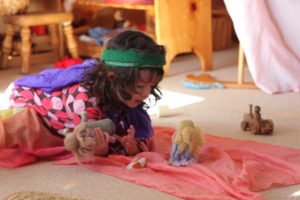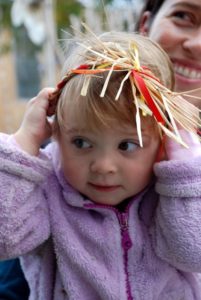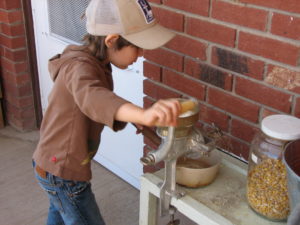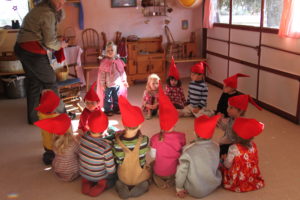Immunity, Health, and Immunizations
Immunity, Health and Immunizations
The Waldorf Philosophy embraces a much different paradigm regarding health and immunity than the modern mainstream. When one begins to understand this it becomes apparent why it is reasonable to question whether immunizations are helpful or not. This is an important factor when attempting to help your child be healthy.
Cosmic Nutrition – The Twelve Senses and Creating A Healthy Environment
The Twelve Senses and Creating a Healthy Home LIfe
In modern life we think of 6 senses, but Rudolf Steiner spoke clearly about 12 senses and others that would develop as humans evolve. This talk helps you understand your child and how to set up a home that is healthy for them and for you. There are practical suggestions about how and why to do this. We learn that the senses help to form the organs and thus the health of the human being.
How to Nurture a Healthy and Thriving Family
How to Nurture A Healthy and Thriving Family In Times of Chaos
This talk focuses on the Soul and Spirit Life of the parent, so that one can become centered in the sacred task of parenting in a way that provides stability, safety and security. There are simple suggestions for actions to take and how to nurture yourself and your child.
Stargarden Parent Perspective #1
Today was my first day as a parent at Stargarden’s Parent Child Class with Miss Vicki. Although we arrived late, due to my daughter’s morning nap, we still made it in time for morning circle, snack, story and free play outside with the other little friends and their parents. My first observations of the program include:
The Environment
Singing
Storytelling
A Gem
Elizabeth Uhrich, Director
Imitation and Movement for Young Children
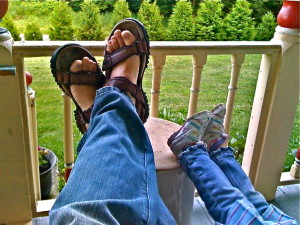 In observing young children one can see that they are attracted to movement with such keen enthusiasm that they cannot sit still, but must move and imitate what they have seen. In the “Pedagogical Value of the Knowledge of Man and the Cultural Value of Pedagogy” Rudolf Steiner shares that “the little child clings with his perceptions to gestures, movements, and motion before all else and that when he perceives any kind of motion he feels the inner urge to imitate it”. In this uninhibited mood they are lost in their surroundings with complete devotion, reverence and awe for what they experience.
In observing young children one can see that they are attracted to movement with such keen enthusiasm that they cannot sit still, but must move and imitate what they have seen. In the “Pedagogical Value of the Knowledge of Man and the Cultural Value of Pedagogy” Rudolf Steiner shares that “the little child clings with his perceptions to gestures, movements, and motion before all else and that when he perceives any kind of motion he feels the inner urge to imitate it”. In this uninhibited mood they are lost in their surroundings with complete devotion, reverence and awe for what they experience.
When the environment is such that the child can be surrounded with movement worthy of imitation, this innately religious devotion is cultivated. Unfortunately, the many handy devices of modern technology hardly provided opportunities for this native capacity. Instead it is helpful to use the more old fashioned devices, for example brooms, rakes, shovels, egg beaters, etc. which provide movement worthy of imitation. It is also most helpful for the child to see an adult who approaches their task with joy and enthusiasm. Daily tasks become inspirational as one realizes that the child can fully experience immersion in reverence and spiritual devotion to the task in the mood of the movement and activity and that this is an antidote to the modern mood of pessimism and sarcasm in adolescence. The child experiences movement as an innately religious experience. This can be cultivated by telling stories of fairies and gnomes or events of your life with gestures and movement imbued with meaning. Children love the movement and activity that fathers often provide.
These old fashioned tools also provide an antidote to the noise that modern devices make. In the formative years a child’s sensory system becomes overwhelmed by such noise. The ear’s capacity to hear becomes coarsened and the perception of the “Music of the Spheres” in the natural tones of birds, the wind, moving water, etc. are lost.A fixation on mechanical noises can develop with a hardening effect on the organs. A quiet time of blessing or prayer is helpful where the attitude and gesture of the reverent adult reveals their inner life and counteracts the coarsening tendency of modern sounds.
In Waldorf parenting and education attention to the subtle details of cultivating soul and spiritual values is emphasized. These experiences of religious devotion in the imitation of the environment and of reverence and awe deeply felt in simple events become a wellspring of vitality for their health and wellbeing in adulthood.
Knowing this you can create a daily rhythm which embraces the child being involved in simple household activities. For instance, when they are puttering about under your feet as you make breakfast, they could be exploring the nature of the material world. Thereby they are experiencing spirit in matter, a gift which they have brought with them
from their recent experiences before birth in the spiritual world. Eventually, they will be so inspired and interested in your activity that they will clamor to participate. At that stage find ways for them to “help”, such as cutting bananas with a butter knife or buttering the toast. They are not only learning the wisdom inherent in practical activities and perceptual and fine motor skills, but they are also learning the value of service to the family.
How to Cultivate Respect and Cooperation and Get Your Child Dressed In the Morning
 While very young children may appear to use logic, their primary modes of learning are imitation and movement; that is the willing soul. Before you begin to speak begin the movement you wish them to imitate and make a general statement, not command, such as we are putting our shoes on now.” Better yet, sing it! This strengthens their willing soul. Young children respond more positively to statements, because questions illicit thinking, which is a part of the brain that needs the underpinning of sound movement skills to function more efficiently. Stories of similar situations from your childhood captivate children as they begin to form inner pictures of your words. Picture forming appeals to their sense of life.
While very young children may appear to use logic, their primary modes of learning are imitation and movement; that is the willing soul. Before you begin to speak begin the movement you wish them to imitate and make a general statement, not command, such as we are putting our shoes on now.” Better yet, sing it! This strengthens their willing soul. Young children respond more positively to statements, because questions illicit thinking, which is a part of the brain that needs the underpinning of sound movement skills to function more efficiently. Stories of similar situations from your childhood captivate children as they begin to form inner pictures of your words. Picture forming appeals to their sense of life.
Use gestures and begin the movement of putting on shoes as you tell the story. Appeal to your child’s imagination. If he/she likes trains, the engineer is putting on boots, because he/she has a big load to haul. Most choices should be made by the adult. For example: in the winter, spring shoes are put away and the child is offered the tall snow boots or the blue ones. When a child makes choices their life force is used for mental activity, rather than to grow a healthy body. Then their sense of well being suffers & cooperation becomes difficult. Create the activity ahead of time. The shoes, jackets, etc., can be set out the night before. The form carries the function. Doing these activities the same time every day will help. The organs become healthier, thus the child’s sense of well being is nurtured. They are more cooperative when they experience rhythm.
Your child is able to be cheerful and cooperative when they experience a bodily sense of well being. Think of yourself as the conductor. Children respond to a self confident parent by imitating confidence. Prepare yourself ahead of time by visualizing and planning how you will conduct the activity. Order, predictability and repetition cultivate confidence and well being. When your child feels a strong sense of life and self they will be more respectful. Allow and encourage your child to do all they can do for themselves, gradually increasing their skill. Song and verses, which portray what they are doing help. Mastery also builds confidence. Activities can become games, time for fun and laughter. How high can the shoes jump once they are on? Use humor, change the subject or sing when a child becomes fixated. This helps switch to a different brain center, which allows the focus to shift from them being stuck on what they don’t want to getting the shoes on.
Tips:
- Focus on what you would like them to do, not what they should stop. The positive focus creates neural pathways which are the basis for more positive behavior.
- Also, use positive reinforcement judiciously so they feel good about their accomplishment, but aren’t trying to people please.
- Occasionally raise the bar. For example: wow, you can put your shoes on! One of these days you’ll be able to tie them too.
- Be clear and consistent with boundaries. Be a great role model and forgive yourself.
- If things don’t go well, at the end of the day tell your child a story with a happy ending of the shoes being put on and going on a great adventure. Thank the angels for the day and for the night. Set the mood for the next day.
- Spend time with yourself considering what didn’t go well. Maybe your child was hungry or overly tired. Ponder how you could do it differently. Plan and visualize your next day.


